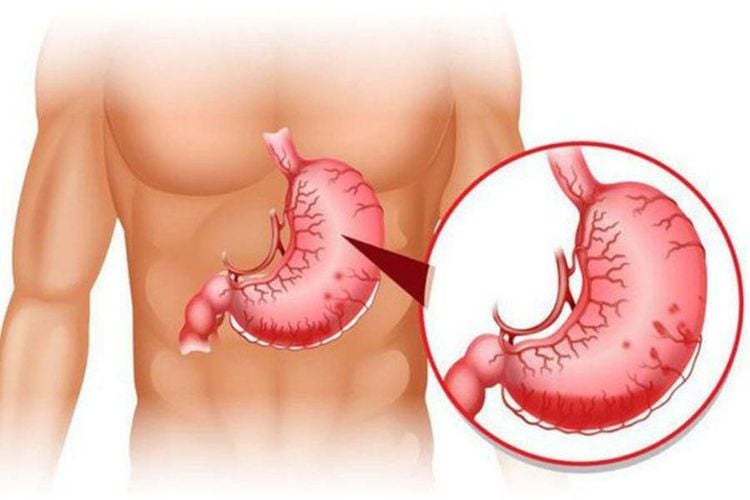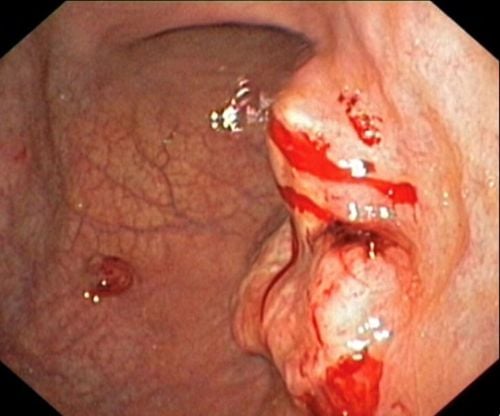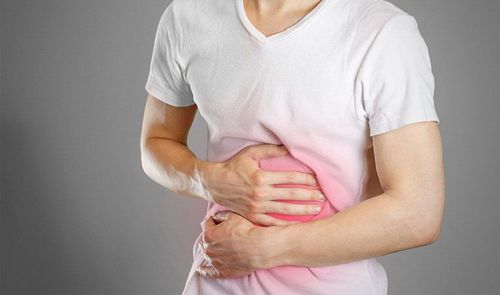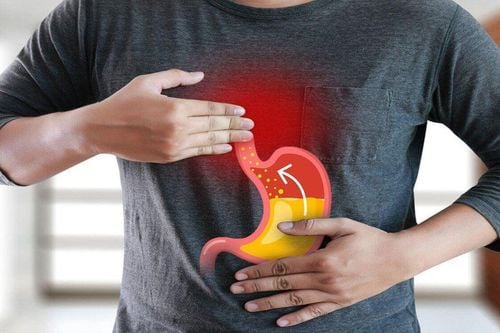This article is professionally advised by Master of Science, Doctor Duong Xuan Loc - Gastrointestinal Surgery Specialist - General Surgery Department - Vinmec International General Hospital Da Nang.
Upper abdominal pain and black, tarry stool are warning signs of many dangerous diseases. Therefore, patients need to be very cautious with these symptoms and should go for medical check-ups for accurate diagnosis and timely treatment.
1. Causes of Upper Abdominal Pain
The upper abdomen is located above the navel and below the xiphoid process. Upper abdominal pain is characterized by dull pain, pain occurring right after eating, or when a patient lies down after eating. In some cases, patients may experience cramping pain, which sometimes radiates to the back.
Upper abdominal pain often accompanies other common digestive symptoms such as bloating and heartburn.
Common causes of upper abdominal pain include:
- Overeating: When eating excessively, the stomach expands beyond its normal size, applying pressure on surrounding organs, leading to symptoms like intestinal pain, shortness of breath, heartburn, acid reflux, and discomfort in the upper abdomen.
- Consumption of irritating drinks: Many people may struggle to digest dairy products due to lactose intolerance, resulting in symptoms such as diarrhea, upper abdominal pain, bloating, and nausea. Additionally, excessive alcohol consumption can cause inflammation of the stomach lining, leading to gastric bleeding, pancreatitis, liver diseases, and upper abdominal pain.
- Indigestion: Often occurs after eating and is associated with symptoms like burping, bloating, and nausea. When eating, the stomach secretes acid to digest food, which can sometimes irritate the lining of the digestive tract, causing upper abdominal discomfort.
- Gastroesophageal reflux disease (GERD): Stomach acid or food from the stomach regurgitates into the esophagus, causing pain in the chest, throat, and upper abdomen. If this condition recurs more than twice a week, it may indicate gastroesophageal reflux disease.
- Esophagitis: Inflammation of the esophagus can result in upper abdominal pain. If not treated early, it can lead to scarring and narrowing of the esophagus, resulting in dysphagia.
- Hiatal hernia: Occurs when part of the stomach pushes through the diaphragm into the chest cavity, causing upper abdominal pain. Other symptoms may include difficulty swallowing, sore throat, throat irritation, and chest discomfort.
- Peptic ulcer disease: Occurs when bacteria or medications damage the stomach or intestinal lining. Symptoms include pain in the upper abdomen, nausea, vomiting, bloating, and delayed digestion.
- Gallbladder disorders: Symptoms can include jaundice, nausea and vomiting, poor appetite, upper abdominal pain, prolonged diarrhea, clay-colored stool, and severe abdominal pain after eating.
- Gastritis: This occurs when the stomach lining becomes infected or malfunctioning immune system or continuous damage occurs to the stomach. Gastritis can be acute or chronic if untreated. Common symptoms include upper abdominal or chest pain, nausea, vomiting, vomiting blood, and black, tarry stool.
- Pregnant: Pregnant women often experience upper abdominal pain due to the growing fetus applying pressure on the abdomen. Moreover, hormonal changes and digestive system adaptations during pregnancy often lead to frequent heartburn. However, upper abdominal pain during pregnancy can sometimes indicate preeclampsia, so it's essential for the expectant mother to monitor this carefully.
- Other causes: These can include stomach perforation, roundworms in the bile duct, pancreatitis, pancreatic cancer, acute or chronic colitis, liver or biliary diseases.
2. Causes of Black, tarry stool
- Bleeding from the upper gastrointestinal tract (esophagus, stomach, small intestine);
- Bleeding from the nose and throat (the patient swallows blood that then passes through the digestive tract, resulting in black, tarry stool);
- Abdominal trauma or esophageal injury;
- Vascular abnormalities;
- Bleeding from esophageal varices (related to cirrhosis);
- Bleeding from inflamed or ulcerated stomach or duodenum;
- Damage to the stomach or duodenum caused by the use of non-steroidal anti-inflammatory drugs, corticosteroids, or excessive alcohol intake, stress,...;
- Biliary bleeding due to diseases involving the bile ducts and blood vessels such as cholangitis, gallstones, hemorrhagic cholecystitis, liver injury, or procedures involving the liver and bile ducts such as liver biopsy, bile duct drainage,...;
- Diverticulitis: Small diverticula can form at any point along the digestive tract, primarily occurring in the distal colon. When these diverticula become infected by bacteria, they can become inflamed, rupture, bleed, and result in black, tarry stool;
- Other causes: Intestinal ischemia, inflammatory bowel disease, effects of radiation therapy, gastric cancer, colon cancer, use of iron supplements, consumption of black licorice, eating blood pudding or well-cooked chicken or duck blood, etc.

3. What do Upper Abdominal Pain and Black, tarry stool Indicate?
The combination of both symptoms, epigastric pain and black tarry stool may indicate chronic gastric bleeding. Small lesions that bleed can, if not treated early, pose a serious threat to the patient's life. Potential complications include:
- Anemia: The lesions will penetrate deep into the gastric mucosa, causing blood vessels to rupture and leading to massive bleeding, resulting in blood loss and the patient experiencing dizziness, vomiting blood, fainting, etc.
- Gastric perforation: Deep lesions that breach the stomach wall can allow gastric contents to leak into the abdominal cavity, causing necrosis of other organs in the body.
- Stomach cancer: Long-term ulcerative damage can result in malignant transformations of cells at the lesion site, developing into cancer cells.

4. Preventive measures for epigastric pain and black, tarry stool
- Eat plenty of vegetables and foods rich in natural fiber, and reduce the intake of saturated fats to lower the risk of constipation, hemorrhoids, diverticulitis, and colorectal cancer.
- Avoid prolonged or excessive use of anti-inflammatory medications like naproxen, ibuprofen, and aspirin.
- Limit alcohol consumption, as excessive drinking can irritate and damage the lining of the esophagus and stomach.
- Do not smoke, as it is a contributing factor to gastric and duodenal ulcers and digestive tract cancers.
- When experiencing epigastric pain accompanied by symptoms such as black, tarry stool, dizziness, sweating, etc., patients should seek medical attention as soon as possible for necessary tests, which can help accurately diagnose the cause and provide timely treatment.
To arrange an appointment, please call HOTLINE or make your reservation directly HERE. You may also download the MyVinmec app to schedule appointments faster and manage your reservations more conveniently.







